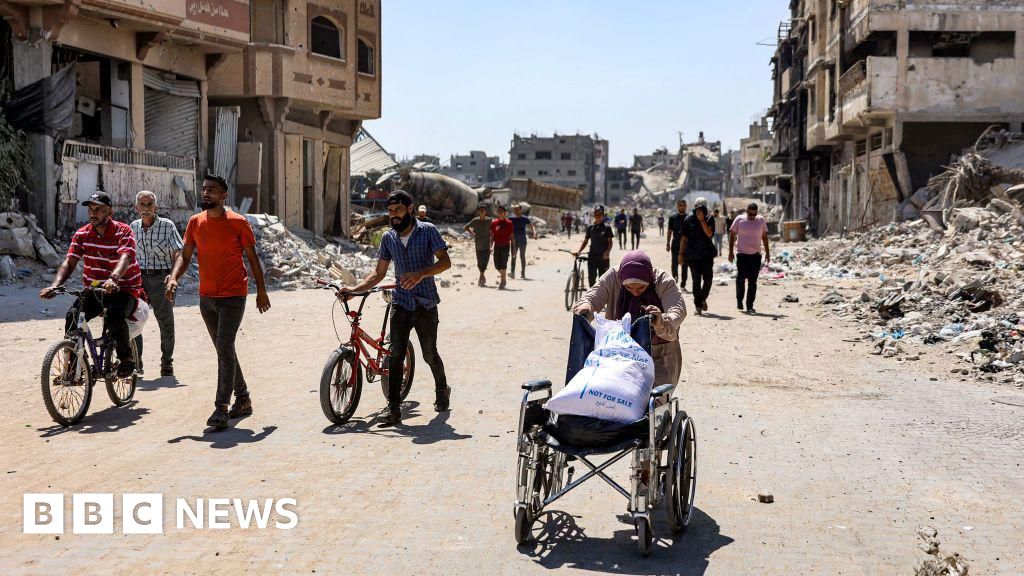Gaza War: Israel attacks Gaza City, tanks enter the center again

- Author, Sebastian Usher
- Role, BBC News
- Report from Jerusalem
-
Palestinians in Gaza City say they have witnessed one of the heaviest Israeli bombardments since Israel began its war against Hamas following its unprecedented attack on October 7.
According to reports, Israeli tank columns are approaching the city center from several directions.
The Gaza Emergency Service believes that several people have been killed, but has not been able to reach them so far as fighting is taking place in several districts in the east and west of Gaza City.
The Baptist Al-Ahli Hospital was reportedly evacuated and patients were taken to one of the few remaining functioning medical facilities in the area – the already overcrowded Indonesian Hospital.
Meanwhile, a senior Palestinian official told the BBC that indirect negotiations between Hamas and Israel over a ceasefire and the release of the hostages were expected to resume in Qatar within the next 48 hours.
A preliminary meeting between the intelligence chiefs of the United States, Israel and Egypt will take place in Egypt on Monday, the official said.
Before the attack on Gaza City, the Israel Defense Forces (IDF) issued evacuation orders for several central neighborhoods, including Tuffah, Daraj and the Old City.
But one of the most heavily attacked areas, Tel al-Hawa, was not included in the evacuation order that the IDF’s Arab spokesman posted online on Sunday along with a map.
On Monday afternoon, the Israeli army issued a new order covering Tel al-Hawa and the Sabra and al-Rimal areas to the north and west.
A resident of Gaza City, Abdel Ghani, asked: “The enemy is behind us and the sea is in front of us, where should we go?”
Others also told the BBC that they did not know where to go and that they had only one option: north, towards the port area of Gaza City.
Some fled the districts after receiving evacuation orders, only to find that the area they had moved to came under Israeli shelling.
In al-Rimal, a freelance cameraman working for the BBC says he did not receive an evacuation order, but later learned that his neighbor had.
He left the area with his family and moved north. They now live in the port area, but they lack basic necessities. He says he struggles to find water for his children.
Israeli forces confirmed in a statement that they launched a new operation in Tel al-Halwa overnight after allegedly receiving intelligence about Hamas and Palestinian Islamic Jihad infrastructure and fighters in the area.
The military also said it had been deployed to the headquarters of the UN relief agency for Palestinian refugees, Unrwa, in the region.
The Israeli military said it issued warnings to civilians at the start of the operation and announced it would open a humanitarian corridor to allow people to leave the area.
The recent Israeli offensive in the Gaza Strip came at a time when hopes were growing that an agreement on a ceasefire might finally be reached.
A senior Palestinian official familiar with the talks told the BBC that indirect negotiations between Hamas and Israel negotiating teams would begin in Doha in the next 48 hours, mediated by Qatar and Egypt.
The official also said that a preparatory meeting between CIA Director William Burns, the head of Israel’s Mossad intelligence agency, David Barnea, and the head of Egyptian intelligence, Abbas Kamel, is scheduled to take place in Cairo on Monday.
On Tuesday, all three intelligence chiefs are scheduled to travel on to Doha.
The official outlined to the BBC several key sticking points from Hamas’ perspective:
- Hamas is demanding the withdrawal of Israeli forces from both the Rafah border crossing with Egypt and the Philadelphia Corridor, a strip of land along the Egyptian border.
- Israel has vetoed Hamas’s demand for the release of 100 high-ranking representatives of the political groups Palestinian Islamic Jihad and Fatah from Israeli prisons.
Hamas’s negotiating team has already dropped its demand that Israel accept a permanent ceasefire as a precondition for a possible agreement.
The official said the negotiation process will be very lengthy and complex, but there is some hope that it could work this time.
A statement by the office of Israeli Prime Minister Benjamin Netanyahu on Sunday may have dampened expectations somewhat: It stressed that no agreement should prevent Israel from resuming fighting in the Gaza Strip until its war aims have been achieved.
Mr Netanyahu has repeatedly defined these goals as the military and political annihilation of Hamas.



